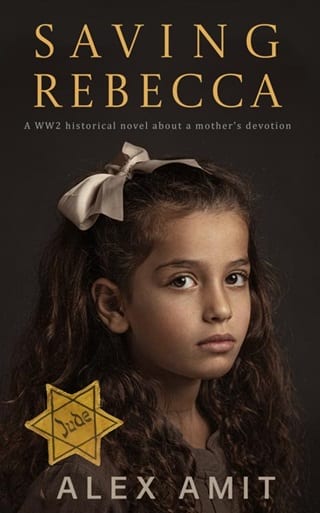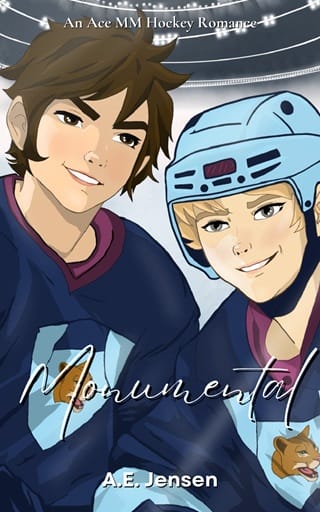10. The train
Chapter ten
The train
"Start moving, get out now," the policeman points his rifle at Charlotte. "Both of you," he points his rifle at me next.
"What about our belongings?" Charlotte asks. She is still standing against the wall with her hands up in the air.
"You won't need them," the second policeman says. He stands up over her scattered drawings, lights a cigarette for himself, and smiles. "You won't need your drawings either," he throws the burning match on one of the drawings. I watch as the small flame trying to spread and eat away at a drawing of people in the yard standing in line in front of a Nazi officer, their heads hanging low. But the match goes out and fails to ignite the paper, leaving only a black ash stain, and the policeman steps on it with his boots.
Think, think, what can I do? What about Rebecca? I just need a few more days.
"Just two more days, then I'll go wherever you want," I quickly tell him and gasp. What will they do with us? Will they put us against the wall? I must save her .
"You know exactly where those who break the rules go," he blows the smelly cigarette smoke at my face. "The train is waiting for you. Start moving, get out," he also points his gun's barrel at me, "now."
"Two more days, please. I'll do whatever you want," I look at him with teary eyes. I think I can hear the women from the neighboring apartments whisper outside, but I'm not sure with all the screaming in my head. What will happen to Rebecca? I must find her and take her with me. I look at the foreigner's suitcase. It's closed in the corner of the room, next to the straw bed on which we sleep. It contains all the clothes I've collected over the past few months. Shall I take it or leave it behind?
"Move, now, without taking anything. What you're wearing is good enough for your trip," he shouts at me, taking my hand forcefully and pushing me toward the stairs.
Go down the stairs, ignore the people watching us from the corridors, ignore his rifle's barrel, which he occasionally sticks into my back, urging me to go faster. I'll see Rebecca, and I'll call her, she should come with me, this is the right thing. I go down the stairs and out to the yard. Next to me, I hear Charlotte's breaths. I think she's trying to tell me something, but I don't understand what it is. Where is my daughter? I'm all out of breath. I'm looking for her outside the camp's barbed wire fence.
"Where are you going?" The policeman hits my arm with his rifle and directs me toward the group huddled next to the gate. I'm not part of them. I have a girl here. I only have to take care of her for two more days and get her out of this terrible place. "Go ahead, join them," he grabs my hand again, pushes me into the crowd, and walks among the other policemen surrounding us. What about Rebecca? I can't see her outside the fence. There is talking and murmurs all around me. More people join the group and push me toward the barbed wire fence and the closed gate. Their body odor makes me sick.
"Sarah, are you okay?" Charlotte holds my hand, pushes through the people, and manages to get close to me.
"I have to find Rebecca," I yell at her. I don't think about the road and the journey to the East. All I can think about now is her. She's my daughter. She must come with me. I push through the people and approach the fence, leaving the group.
"You, go back," one policeman raises his voice and points his weapon at me.
"I have to find my daughter," I ignore his threat. "Rebecca," I shout, panting, "Rebecca," I look toward the commander's barracks. She's playing with the commander's daughters. "Rebecca," I shout and wave my hand at her.
"Mrs., I'm warning you," the policeman yells at me, but I ignore him.
"My daughter is there. I need to get her," I shout to him.
"You can't leave the group. Go back in," he shouts back at me. "You're on the list."
"I have to," I wave my hand at her. The policeman at the gate opens it, and the people start walking out slowly. "Rebecca," I shout, and I move toward the gate. A few people stand in the yard and watch us in silence. Where is Charlotte? I lost her among the crowd. Where's Mathéo? He'll help me, he must; he'll take us off the list. I'm looking for him among all the policemen, but he's nowhere to be found .
"Please, help me," I run and fall at the feet of the large policeman with the thin mustache. "Please, my daughter," I whimper as I clutch his legs.
"Get back to the group," he yells at me and kicks my face, trying to free his legs, and I'm thrown backward onto the ground. For a moment, I fold at his feet, wipe the tears from my eyes, and try to get up, ignoring the metallic taste of blood in my mouth.
"I must get her. Where is Mathéo? The policemen," I whisper and get up, walk away a few steps from him, then start running toward the gate and the people passing through it. "Rebecca," I shout to her as I pass through the open gate along with all the people leaving the camp and keep running in her direction. But then I feel a terrible blow to my head, and there's darkness all around me.
"Sarah, are you okay? Sarah, get up, keep walking," someone caresses and holds on to my arm, and I try to get up. My head hurts so bad. "Sarah, are you okay?" The voice continues.
I'm out of the gate. My mouth is full of dirt and the taste of blood. Where is Rebecca? I look around.
The people keep walking around me; they overtake me.
"Sarah, you must get up. Put your hand on my shoulder, like this," I feel Charlotte's hands trying to pull me up so I can stand. A man I don't know in a bright button-up shirt, who smells of cigarettes, approaches us and helps her get me up. I put my hands on Charlotte's and his shoulders.
"You have to walk," he tells me. "They're looking at you," he turns his gaze to the two policemen slowly walking toward me.
"Rebecca," I say quietly, looking at her direction. As if in slow motion, I see her running with the camp commander's daughters, not noticing me. They throw Sylvie the bear in the air as she runs and tries to catch her. "My Rebecca," I whisper. My head hurts so much.
"Walk, keep walking," the man in the button-up shirt supports me as I lean on Charlotte's shoulder, and we walk among the people on the road leading to the houses around the camp. Once again, I turn my head and look for her, but the people around me hide her from me, and I can no longer see her. "My Rebecca," I whisper.
"I'm so sorry," Charlotte repeatedly says to me as she helps me walk slowly among the people on the main street, but I don't know why she's saying that. My head hurts so much, and I feel dizzy. The people walking around me seem to have nothing to do with me. They carry suitcases or bundles of clothes tied in a blanket on their backs. I watch a woman holding her daughter's hand. Her child walks quietly beside her and occasionally starts to run, trying to keep up the pace. She hasn't forgotten her Rebecca. Why does my head hurt so much? I touch my scalp, feeling a big, painful bump. What happened in the last few minutes? Everything is so unclear to me.
"Sarah, I'm so sorry," Charlotte continues to whisper to me while panting. My legs seem to continue on their own. I feel Charlotte's hand around my waist, supporting me all this time. Sometimes, the man in the button-down shirt helps her. Some people from the town are standing by the side of the road and looking at us. Only now, do I notice that German soldiers have replaced the French policemen, and they're walking beside us, holding on to their guns. I should try to escape, like that young man who tried to escape the day we arrived. I'll run away and get back to Rebecca. But I'm dizzy and nauseous, and I can barely walk. If Charlotte or the stranger will stop supporting me, I'll probably fall on the road, and the German soldiers will come to me. I feel like vomiting.
"I'm so sorry, it's my fault," Charlotte says again, as we enter the small train station with all the people and stand on the platform. The word ‘Drancy' is written in large black letters on the wall of the two-storied small station building. Only one long freight train is waiting at the station. The doors of the brown, wooden carriages are wide open.
"What do you mean?" I finally turn to her and ask, speaking for the first time since what had happened at the gate.
"It's because of me, they took us because of my paintings. I'm so sorry," she looks at me, all teary-eyed.
I feel I'm getting even more nauseated. I can't answer her. I'm being taken away from my daughter because of her. Because of her paintings.
"Please, Sarah, say something," she looks at me pleadingly. But I have nothing to say to her. Not now. Her hand touches me, it feels like a branding iron searing my flesh. I want to expel all the pain from my heart, but I can't say a single word. I can't have her beside me. I let go of her hand supporting my body and slowly walk away from her, along the platform, making my way through the crowd.
"Everyone, get onto the carriages," someone holding a megaphone announces in German, his metal voice blows like a chilly wind through the platform.
We've been huddling in the crowded train car for several days now. I have no idea how long. I lost count. I stand inside the car and raise my head, trying to look above the people's heads at the light penetrating through the small window at the end of the car, during the day, or the few stars at night. The small window is covered with barbed wire, so no one tries to escape. Sometimes, I can see the tops of the trees when we pass through forests. Sometimes, I sleep standing up. Sometimes, I hallucinate and imagine Rebecca's voice calling or talking to me. I'm so thirsty. My throat is dry.
A day or two ago, we got water from people when the train stopped at one of the stations. I have no idea who they were. I didn't even see them. One of the men standing near the window said they spoke Polish. We carefully passed the enamel cup from one hand to another, over the people's heads, so that everyone could drink before the train continued on its way. My legs are so sore from standing for so long. Sometimes, I try to move a little, but it's impossible with all the people around me. I'm huddled between several women, but I have no idea where Charlotte is. I hadn't seen her since I walked away from her at the train station in Drancy, and we got into the carriages. And all this time, I hear the locomotive blowing like a dog that won't stop running. And all this time, I'm thinking about the fact that I lost my daughter.
"Auschwitz," a tall man standing next to the small window shouts in the car. "On the sign, it says that we're arriving at Auschwitz," he shouts again and keeps looking out. "There are some village houses and a large camp here."
The people murmur louder as the train slows down. I'm so thirsty. Maybe we've arrived at our destination, at the resettlement camp.
The train suddenly stops, and the people in the car become quiet. Outside, I hear voices talking and dogs barking. Have we arrived?
Suddenly, the car door opens, and bright daylight breaks in. I blink, adjusting to it.
"Everyone, get off, leave all your belongings on the train," someone from outside shouts at us in German. "Schnell, schnell," and we hurry to get out and huddle on the platform. My legs almost refuse to walk after the prolonged standing. I look around at the large camp, the platform full of people, and German soldiers standing and guarding it, holding on to German Shepherds that are barking at us.
"Everyone, line up in two rows, men and women separately," someone shouts. I can make out Charlotte at the end of the platform. She seems to be watching me but doesn't walk in my direction. I don't approach her either.
What is this place?
The people begin to walk toward an S.S. officer standing at the end of the platform. He keeps his leather glove-clad hand indifferently in the air and signals the people in what direction to go - left or right. He sends most of the people to the left. What does it mean? I carefully touch the Star of Life and Death sewn to my dress. Who will take care of my daughter should something happen to me?
 Fullepub
Fullepub 



